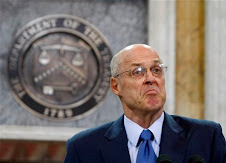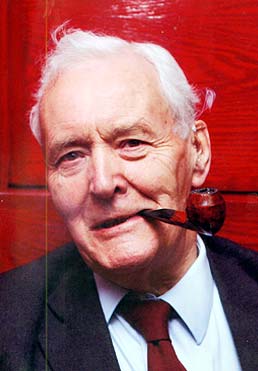
This is a very typical middle class/liberal/Democratic Party perspective. Norman Markowitz is a Barack Obama booster who sees the salvation of capitalism in regulation and oversight.
Typical of this middle class/liberal/Democratic Party perspective is the absence of any concern for, or acknowledgment of, the day-to-day problems of working people. Also noticeable is the lack of concrete solutions.
Professor Markowitz has been known to flirt with Marxism from time-to-time but the Professor has obviously failed to grasp the fact that capitalists have made tremendous profits and left the working class with all the problems.
However, given these noted shortcomings of Alan Greenspan's ideas by this wannabe Marxist Professor, Markowitz does bring forward some very significant points regarding the limitations of Alan Greenspan's thinking and ideas which served his corporate clients so well--- until now.
Unfortunately, Professor Markowitz fails to bring forward what kind of thinking and ideas are needed to replace all this "free market" ideology of Alan Greenspan and his little Ayn Rand led "think tank" which met regularly in Rand's home.
Markowitz gloats with Congressman Waxman exposing the failure of Greenspan's ideology; but, the Professor never wonders why Waxman has refused to ask the all important question of Greenspan or any of the other capitalist sooth-Sayers:
Can capitalism escape a major depression?
Of course in answering this question one then has to ask the question:
Is the problem one of a failed ideology or a failure of the capitalist system?
Perhaps Professor Markowitz would like to answer these questions here.
Without answers to these two questions from middle-class/liberal/Democratic Party intellectuals we really can't say that Professor Norman Markowitz and the Obama crowd have any better ideas than Alan Greenspan when it comes to finding solutions to the problems of working people.
No wonder Karl Marx has become a best-selling author in spite of being buried numerous times in university classrooms and in the pages of the mainstream media, only to be resurrected as this capitalist economic crises deepens--- could there really be something to the Marxist idea that the capitalist economy operates in boom-bust cycles and the system is taking one hard belly-flop?
We are living in what is increasingly being referred to as a "Marx moment."
Professor Norman Markowitz might blow the dust off all those copies of Marx' "Capital" stored away in the Rutger's University Library and get his students reading because it doesn't look like this little blip in what George Bush describes as a "robust free market economy... the strongest in the world," is going to pass by the world of Ivory Towers... whether Oxford or Rutgers.
Alan L. Maki


Thursday, October 23, 2008
by Norman Markowitz, Professor, Rutgers University
Alan Greenspan told a House Committee investigating the deluge in finance today of his shock that banks could not regulate themselves. Greenspan then went on to say that he had "found a flaw" in his "free market" world view, adding "I don't know how significant or permanent it is. But I have been very distressed by that fact." When asked by committee chair Henry Waxman if "your ideology was not right, it was not working," Greenspan added Absolutely, precisely....the reason I have been shocked because I have been going for forty years with very considerable evidence that it was working exceptionally well."
Forty years? Exceptionally well? A flaw? Don't know how significant or permanent it is? These are the comments of the man who was Chair of the Federal Reserve, the the second most powerful executive position in the U.S., for eighteen years? And this ahistorical irrational and comical response to a disaster of this dimension is what he has to say?
First, Greenpan's statements make little historical sense because the deregulation that we are talking about didn't develop forty years ago during the Johnson administration but a generation ago in the Reagan administration, and not all at once. Maybe Greenspan forgot that because in the 1960s, he was a follower of Ayn Rand, whose Objectivist cult looked to free market Supermen,a sort of extreme right-wing individualist anarchism as far removed from reality as the extreme left collectivist underground of the Weathermen which Bill Ayers belonged to at the time. Of course, Randians were never connected to acts of violence against the government. Of course, But then again, Weathermen never served in cabinet positions, not to mention chair of the Federal Reserve.
The Savings and Loan collapse of that period which occurred when Paul Volcker, Greenspan's predecessor, was Chair of the Federal Reserve, might have suggested to Alan that there was a "flaw" in this kind of policy, but it apparently didn't. The decline in real wages, huge rise in income inequality, increase in human suffering that these policies visibly produced in the U.S. didn't factor into Greenspan's thinking either, since the great majority of the victims, particularly children, were either marginal or completely outside of a political process where less than half the eligible voters were voting and non voters were drawn overwhelmingly from lower-income groups whose living standards were deteriorating.
As I read Greenspan I see an interesting hybrid of man, someone who was smart on the specifics, know about the ins and outs of finance, but was totally out of it in terms of the larger picture, a "perfect fool" so to speak for those who would rob the system blind because he was completely blind to their abuses until they overwhelmed the economy--a bit like those in the 1920s Republican governments who didn't have to be bribed to hand over to corporations public property because they believed in a kind of divine right of business.
Perhaps if Greenspan had not gone from being a not so successful Jazz saxophonist to being a follower of Ayn Rand, he might have discovered that the "flaw" in his argument was discovered by capitalist economists in the late 19th century, those who didn't need Karl Marx to explain to them that the way real markets worked had little to do with the theory of the a "self regulating" rational "free market" governed by a "law of supply and demand" where rational "economic man" ate fish when the price of meat was to high and then the price of meat would come down, and bankers invested their capital prudently to seek both the highest and the safest investment and those who didn't would run out of money and collapse just as the economic man who continued to eat meat would run out of money and starve. That system, even without bailouts for the banks or food stamps for the economic man, never had any relationship to reality with the rise of mass production industrial capitalism
Alan Greenspan won't lose his home and I am sure can protect his pension. His distress will be very different from the millions who have for years faced the economic consequences of the policies that he championed, the "forgotten millions" of the 1980s and 1900s whose jobs and pensions were casualties of what some called "the Reagan revolution." Now, when those millions are on the brink of multiplying, when a greatly weakened and under supplied safety net is about to face a huge increase in demand for services, Alan Greenspan's economic theories and policies should be returned to the pre Ragtime nineteenth century world where they already considered relics by many.



















 Delicious
Delicious Digg
Digg StumbleUpon
StumbleUpon Propeller
Propeller Reddit
Reddit Magnoliacom
Magnoliacom Newsvine
Newsvine Furl
Furl Facebook
Facebook Google
Google Yahoo
Yahoo Technorati
Technorati





